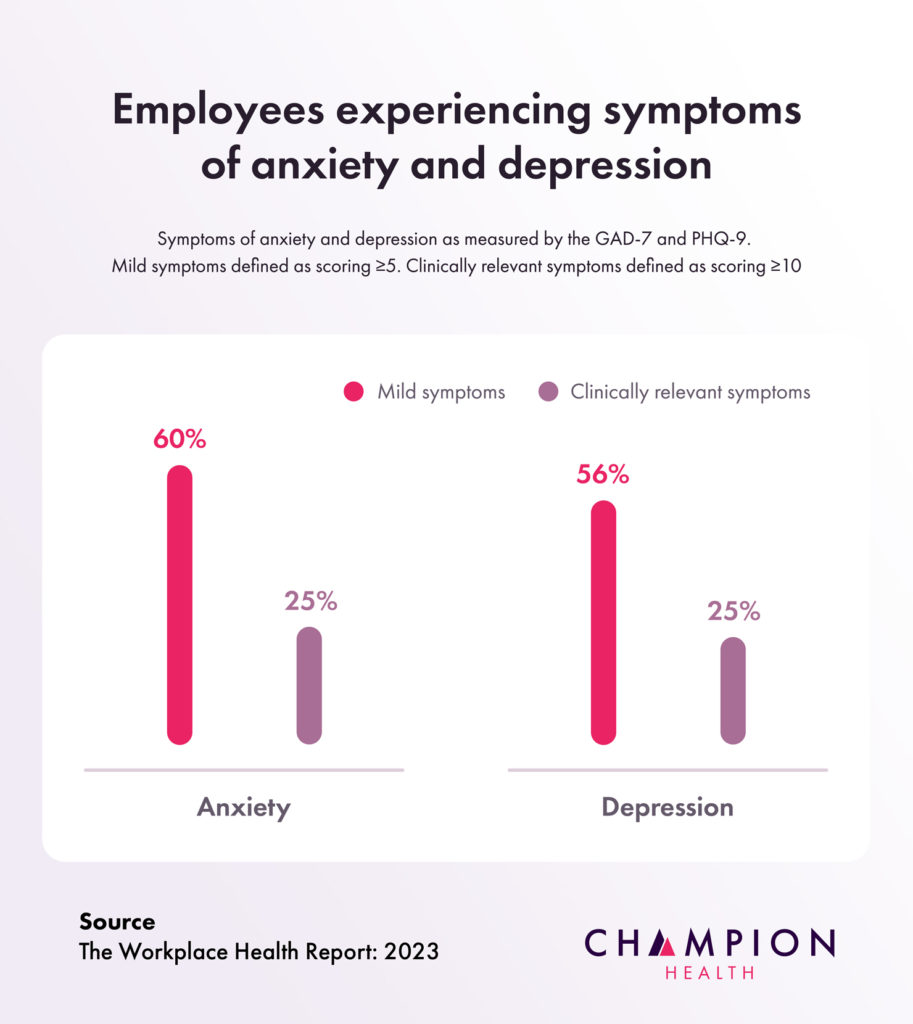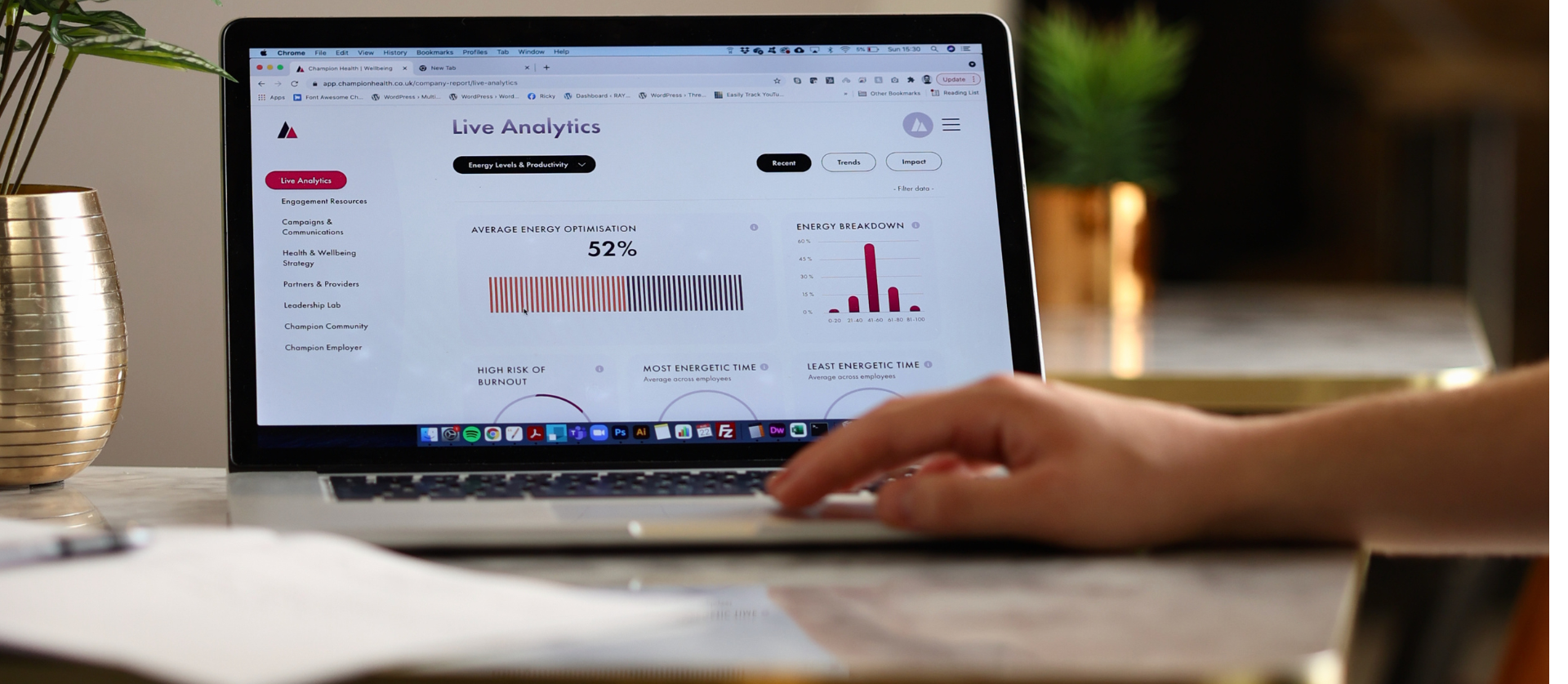With employee wellbeing statistics revealing that nearly 3 in 5 employees are experiencing symptoms of depression, organisations must take steps to address depression in the workplace.
This article outlines actionable steps that wellbeing professionals, leaders and people managers can take to proactively support employees experiencing depression. You’ll discover:
- What is depression in the workplace and beyond?
- Depression in the workplace statistics
- How to spot depression at work
- Five ways to support employees with depression
What is depression in the workplace and beyond?
To recognise the signs of depression and support employees experiencing it, you need a basic understanding of what depression is, and how it may present itself.
Depression is a mental health condition that can make you feel persistently down or sad for weeks or months at a time.
It has a range of different physical, social and psychological symptoms, which affect each individual person differently.
These may include:
- Feeling hopeless
- Losing interest in activities
- Experiencing bouts of sadness
- Having low self-esteem
- Experiencing symptoms of anxiety
- Unexplained aches and pains
- Disturbed sleep
- Lacking energy
- Avoiding contact with friends
- Neglecting hobbies and interests
For a more comprehensive list of symptoms, access this article from the NHS.
Depression can also vary in severity. Mild depression only has some impact on daily life, moderate depression has a significant impact on daily life and severe depression makes it almost impossible to get through daily life.
Causes of depression vary significantly, from loneliness, to poor financial wellbeing, stress, lack of sleep and beyond.
Anyone can experience depression, regardless of their age, gender, level of seniority or life situation. As we revealed in the Workplace Health Report, symptoms of depression are now commonplace among our employees.
If you are concerned that a colleague is experiencing severe depression then read this article on how to support an employee in crisis.
Depression in the workplace statistics
Depression statistics show that 56% of professionals are currently experiencing symptoms of depression. What’s more, one in four employees also meet the criteria for clinically relevant symptoms of depression.
Diving deeper into the data revealed that female employees are more likely to experience depression, as are younger employees.
Finally, Champion’s research also revealed that only 1 in 10 employees are seeking mental health support, despite almost 1 in 5 being diagnosed with a mental health disorder.
These results highlight the need for organisations to be proactive about supporting employee mental health, and take specific actions to reduce incidences of depression in the workplace.

How to spot depression at work
The signs of depression in the workplace vary from person to person. One person could be experiencing low mood, whereas another may be finding it impossible to focus on their work.
Depression can also be very hard to notice, especially if you don’t know what you’re looking for. That’s why it helps to be aware of common symptoms and behaviours to look out for, to help you spot the signs of poor mental health at work.
By being proactive about recognising depression in the workplace, you will be well-placed to support your employees when they need it.
Here are 10 symptoms of depression in the workplace to look out for amongst your employees, according to Mental Health Foundation and Priory Group:
- Constantly feeling down or sad
- Showing signs of low confidence
- Constantly feeling tired or lacking energy
- Avoiding colleagues and withdrawing from social situations
- Struggling to complete work on time
- Experiencing anxiety
- Taking a lot of sick days
- Struggling to concentrate, focus on work or make decisions
- Appearing disinterested in things they used to enjoy
- Acting more irritable and agitated than usual
As with all mental health issues, the best approach to recognising depression in the workplace is getting to know and really understand your people. Then, if they act differently to usual, you will be able to identify these unusual behaviours and intervene more quickly.
Five ways to support employees with depression
As a leader, manager or colleague, you have an important role to play when it comes to supporting an employee with depression.
That’s because the support you provide is key in determining how well that person is able to manage their symptoms.
With that in mind, here are five ways to support an employee with depression:
- Promote positive discussion around mental health
- Discuss the adjustments you can make
- Make a plan
- Respect confidentiality
- Know where to signpost for further support
Read on for a more detailed look at the ways you can support employees with depression.
1. Promote positive discussion around mental health
According to Mind, only 30% of employees feel able to talk to their managers about mental health. This culture of silence means most mental health issues go unnoticed and untreated.
By promoting positive discussion of mental health, you will build a psychologically safe workplace, where these issues can instead be identified and reduced.
There are several ways to do this. Start by discussing mental health during 1:1s. Some colleagues would prefer to talk about their mental health in a confidential environment so a 1:1 or staff appraisal may be the perfect place to get the conversation going, so long as your organisation has already fostered a culture of openness.
If you feel comfortable doing so, it is also incredibly powerful to share your own personal stories of mental health. If your people see their leaders opening up and embracing vulnerability, it gives them permission to do the same.
The power of sharing stories was demonstrated by the “I’ve been there” campaign during Mental Health Awareness Week.
Finally, make sure that you’re always available to help your employees, and make sure they know that. An open-door policy is pointless if no-one comes to the door.
Watch the video below for more information around talking about mental health with employees.
2. Discuss the adjustments you can make
If a colleague lets you know that they are experiencing depression, there are many reasonable adjustments you could make to support them.
Examples of these adjustments include:
- Introducing flexible working hours
- Changing their responsibilities
- Allowing the employee to work from home
If depression has a long-term effect on the day-to-day activities of the employee, then it is considered a disability. In these cases, organisations are legally required to provide reasonable adjustments to support those employees.
Read the following article to discover more adjustments you can make to support your employees: 10 Reasonable Adjustments for Employee Mental Health
3. Develop an action plan
Action plans can be a wonderful tool in helping employees either proactively manage their mental health or respond to a mental health issue.
Ideally, these plans are made when employees are thriving, so they can determine in advance the specific steps they’ll take when they are not coping so well.
According to Mind, these action plans should cover:
- Symptoms, early warning signs and triggers
- The potential impact of a mental health issue on performance
- The support they’ll need from their line manager
- Positive steps the individual should take
Work with each individual employee to develop a personalised action plan. As well as being a proactive way to manage the mental wellbeing of your employees, this also sends a clear message to the employee that you’re there to support them when they need it.
4. Respect confidentiality
It is clear from Mind’s report entitled ‘Are remote mental health services effective?’ that a key concern for people using remote mental health services is confidentiality.
The same applies to in-person support, with employees often feeling apprehensive about disclosing any mental health issues. People are often worried that doing so will harm their reputation or prospects.
So, when discussing mental health with one of your team, make it clear early in the conversation that anything they disclose will be kept private.
However, confidentiality does have its limits, and when a person is at risk of harming themselves, the limits of confidentiality are reached.
If you believe this is the case, you should do everything you can to keep the employee safe, including informing a relevant person or calling 999. This will ensure that your colleague will get access to timely and appropriate help.
5. Know where to signpost for further support
Depression can become a serious health issue and it may be beyond the scope of a people manager or HR team to provide an employee with the support they need.
When this is the case, it is crucial that you know where to signpost the employee for further support.
Support could include internal wellbeing offerings, such as employee assistance programmes or occupational health.
You could also signpost your employees to external services. There are some fantastic organisations you can recommend for further support with depression including:
For more information on how to support struggling colleagues, share this resource within your team: The CLASS Approach: how to support others
Depression in the workplace: send the right message
People experiencing depression in the workplace are entirely capable of not only continuing to work, but also flourishing. However, they will often need the support of their employers to do so.
Standing by your people when they are experiencing hardship is not only about helping them be healthy and perform to their best. It is also about acting according to company values centred around caring and compassion.
Build a company culture around these values, by supporting your people when they need it.





